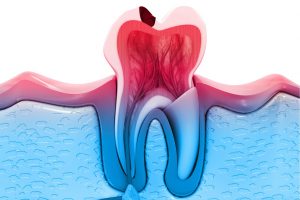 Many people recognize the terms tooth decay and cavities, and many have already had to deal with the condition at some point in their lives. However, for people who haven’t experienced it, or for those who were able to address their cavities with minor, minimally invasive treatment, the potential severity of tooth decay may not be so obvious. The truth is that tooth decay has many different levels, and the longer it’s allowed to progress, the greater damage it can cause to your tooth structure.
Many people recognize the terms tooth decay and cavities, and many have already had to deal with the condition at some point in their lives. However, for people who haven’t experienced it, or for those who were able to address their cavities with minor, minimally invasive treatment, the potential severity of tooth decay may not be so obvious. The truth is that tooth decay has many different levels, and the longer it’s allowed to progress, the greater damage it can cause to your tooth structure.
The early, preventable stage
The first stage of tooth decay is a process known as enamel erosion, which involves your healthy, natural tooth enamel losing minerals and growing weak under attacks by harmful oral bacteria. Your teeth naturally bounce back from these attack by replenishing their enamel with nutrients. However, if enamel erosion occurs too often, it can be a precursor to cavity development. In this earliest stage, you have a chance to prevent decay from forming by taking steps to strengthen your weakened tooth enamel, such as improving your daily hygiene routine and asking your dentist about fluoride treatment.
The mild to moderate stages
When tooth enamel does become compromised, that means it has developed a hole that your tooth can no longer repair. This hole allows bacteria to infect the main tooth structure, and grows larger as the tooth infection progresses. In these mild to moderate stages of tooth decay, the resulting cavity can often be cleaned and filled with minimally invasive treatment. Known as tooth filling, this can involve the use of tooth-colored biocompatible composite to match the tooth’s color and restore the structure that’s been decayed. It can also prevent your tooth decay from becoming more severe, and needing more extensive treatment to address it.
The more severe, internal stages
More severe cases of tooth decay are often referred to as internal tooth decay because the infection has reached the inner pulp chamber and root canal of the tooth. Your tooth’s and other soft tissues are located here, and every symptom of your tooth decay can become significantly worse when they’re infected. Saving the tooth and alleviating the symptoms could require root canal treatment, which involves removing all of the tooth’s infected tissues as well as the decayed tooth structure.
Learn how to treat your tooth decay
The fact that tooth decay gets worse over time means that treating your tooth could require a different treatment, depending on how severe it is. To learn more, schedule an appointment or initial consultation by calling Advanced Dental Concepts in Auburn Hills, MI, today at (248) 852-1820.



